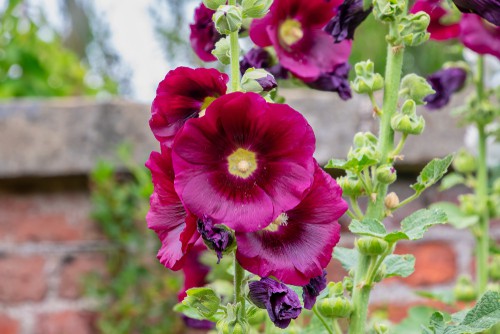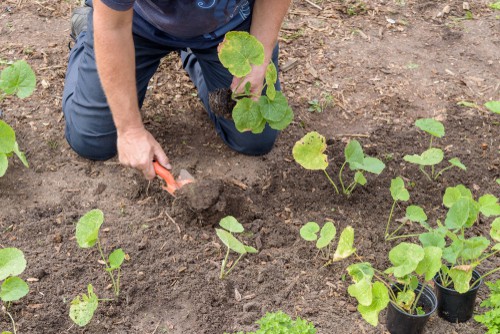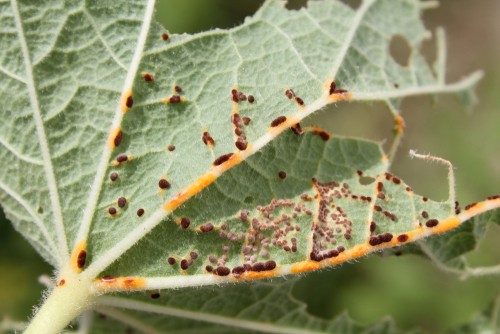Last updated on May 5th, 2022
Our site is reader supported, this means we may earn a small commission from Amazon and other affiliates when you buy through links on our site.
Growing Hollyhocks is a wonderful goal as a gardener. If you treat them well you can get them to grow up to a very impressive 3 metres tall and tower above any other part of your garden, adding a stunning and visually appealing vertical element.
As long as you find the right location in your garden and you offer them a little bit of care, you can grow beautiful Hollyhocks that continue to appear year after year.
It’s worth mentioning early on that we recommend spraying them with a fungicide twice a week during the growing season to help prevent rust. Unfortunately, rust can become a big issue if not controlled.
Do you want to grow Hollyhocks from seed? If so, you can read our step by step guide here
Planting Hollyhocks

Plant in free-draining moisture retaining soil
Hollyhocks require full sun and rich, well-draining soil. One mistake made by a lot of new gardeners is to plant them in soil that is simply too dry to sustain them. The whole point of growing the Hollyhocks successfully is to get flowers every year, but if the soil isn’t right, you won’t get this.
Mix plenty of organic matter into the soil before planting and water well during dry spells, especially newly planted plants.
Planting seeds and young plants
- If you are planting Hollyhocks from seed, sow the seeds outside about one week prior to the last frost in your area.
- If you are planting Hollyhocks from young plants, place them outside about 2 or 3 weeks after the last frost in your area.
Hollyhock seeds have to be planted right below the surface, no more than half a centimetre deep if that. They should, however, be spaced about half a metre (or more) apart in order to grow successfully if you are growing them directly in the ground. We recommend growing them in seed trays first and then potting them up into small pots and then planting them outside.
Growing Hollyhocks in the garden

They require very minimal care but only last for 2 to 3 years
Once you have planted your Hollyhocks, they require very minimal care. However, Hollyhocks are short-lived perennials and that means that the majority of varieties you grow from seed or from young plants will only live for 2-3 years. You can extend their lifespan a little by removing some of the growing flowers as soon as they fade.
They usually self-seed well
One benefit of not removing faded flowers is that they will reseed themselves so while the original plant might be short-lived, you can continually grow more plants in the following years.
To learn more about what to do with Hollyhocks after flowering read my guide here
Feeding
Hollyhocks benefit from a mulch of compost and slow-release fertiliser in the spring so be sure to do this annually to keep your plants healthy.
Watering
They also prefer moist soil so water regularly but not too much that the soil becomes waterlogged, this is especially true during times of drought.
Common problems when growing Hollyhocks
Hollyhock rust
Hollyhocks are very easy to grow, as mentioned, but that doesn’t mean they have no problems whatsoever. When you are growing these fantastic plants the biggest thing you need to look out for is rust. Rust typically attacks the lower leaves and eventually makes its way to the upper leaves. Rust is something you need to work hard to keep to a minimum if it has manifested already.

Preventing diseases
Always water at the base of the plant and not from above to help minimise the spread if there is an infestation make sure your plant has good air circulation by abiding by the spacing mentioned above when you plant it. If you have mature plants that have outgrown that spacing, trim them or transplant them so that you have better airflow. Once you notice rust on the lower leaves always treat them with a fungicide immediately.
See our detailed guide on Hollyhock rust, how to treat it and recommended fungicides
These steps will not entirely eliminate the issue but they will go a long way toward keeping it contained and preventing it in the future.


